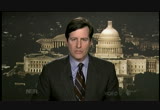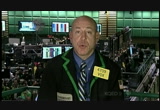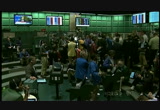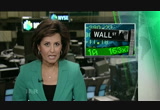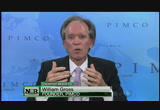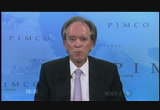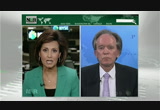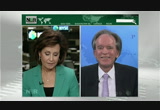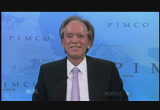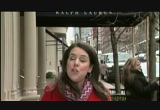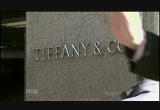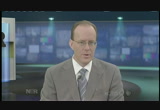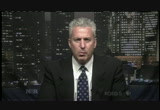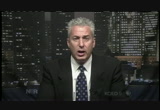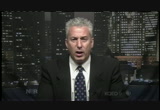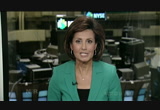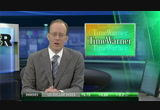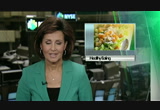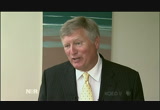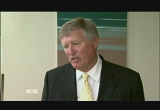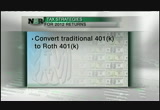tv Nightly Business Report PBS February 7, 2013 1:00am-1:30am PST
1:00 am
>> reporter: and the postal service is tired of trying to beat free. so it plans to eliminate saturday home mail delivery beginning on august 5. the move will cost 22,000 workers their jobs and may save $2 billion a year. but even that, will not be enough. more dramatic cuts will be needed. >> you can't support a system built for 200 or even 300 billion pieces, now we got 150 billion, which is still a boat load of mail. >> reporter: the business community is split on the end of saturday delivery. many companies worry they'll pay more to shore up the postal system. others fear the cutbacks will put them out of business. many rural newspapers depend on saturday deliver. and greeting card giant hallmark worries small towns and small businesses will be hit hard by service cutbacks. but the postal service won't shut down altogether on saturdays. it will still deliver packages on saturday as demand continues to grow. >> people order goods online at an ever increasing rate and we
1:01 am
expect e-commerce will drive consumer habits in that direction for the foreseeable future. >> reporter: fedex and u.p.s. compete with the postal service, but they are also suppliers and customers that rely on mail carriers to deliver some packages. analysts say the postal service would have to run into far more trouble, for fedex and u.p.s. to see a big financial boost. >> we don't think either u.p.s. or fedex is interested in carrying first class mail, well i should say they're not interested in carrying it for 5o cents a package. they'll carry it at their normal ground and express rates and they'll deliver it on a timely manner, but to deliver something for 50 cents, that's just not in the profit mandate for these companies. >> reporter: congress will have the last word on saturday delivery. one in ten americans still have no internet access at home. that's a large group of voters with a good reason to press lawmakers to keep the mail coming on the weekend. darren gersh, "n.b.r.," washington. >> tom: have you filled up your gas tank recently.
1:02 am
it is costing more, a lot more. regular unleaded jumped 15-cents a gallon in a week. the national average is up to $3.54 a gallon. that's the biggest one week jump in nearly two years. and as erika miller explains, prices are expected to continue to climb in the weeks ahead. >> reporter: winter is supposed to be the time of year when gasoline is cheap. but that hasn't been the case lately. prices at the pump have risen 20 days in a row, and so far this month, prices are at the highest level for any february, ever. so why are prices rising so quickly? >> part of the root of that has to do with refinery outages that we've had-- a series of them over the past few weeks, and that has curtailed the production of gasoline, and therefore put upward pressure on gasoline prices. >> reporter: there are also fears refineries will face more interruptions, as they switch from winter to summer fuel blends. it's not just refinery issuesy
1:03 am
pushing prices higher. much of the recent spike in gasoline can also be blamed on geopolitical tensions. >> investors are looking at what's going on in syria-- revolution over there, israel bombing syria and then iran saying they will respond, that doesn't help things. so that adds uncertainty and risk to the marketplace. >> reporter: although the u.s. economic recovery stalled out at the end of last year, there's hope for a rebound this year. at the same time economic data from china and europe has been improving, all of which could boost global energy demand. triple-a predicts prices at the pump will keep climbing, topping out somewhere between $3.60 and $3.80 a gallon this spring. but aders say if you want a quick way to know where prices are headed, watch the stock market: >> oil prices look at equity market as a proxy for demand, or future demand. we are at 14,000 in the dow, no
1:04 am
coincidence that we are at the highs of the energy market as well. >> reporter: and the higher price of gasoline comes as workers have less take-home pay, because of the expiration of a payroll tax holiday. so will consumers be forced to cut back spending, hurting economic growth, and stock market performance? >> not necessarily, because rising gasoline prices is usually predicated on a weaker dollar or better economic activity. better economic activity would lead to higher earnings. >> reporter: wolfberg says crude prices would have to jump $10 a barrel, or roughly 10%, before there's a major hit to the u.s. economy. erika miller, "n.b.r.," new york. >> tom: still ahead, the federal reserve is the latest target of a cyber attack, are companies taking cyber risks seriously? >> susie: on wall street today, a choppy day of trading with investors focused on new concerns about the outlook for europe's economy, and a new batch of corporate earnings. with more than half of the companies in the s&p reporting, quarterly results have been better than expected.
1:05 am
still, by the closing bell, stocks were virtually unchanged. the dow rose seven points, the nasdaq fell three, and the s&p added nearly a point. >> susie: while the stock market is flirting with new record highs, bill gross is worried about the future. the founder and co-chief investment officer of pimco, the giant bond fund, has just come out with a gloomy forecast, warning investors of a "credit supernova". >> susie: that sort of sounds like a sci-fi movie. but reading your report, you're trying to tell investors to stay out of the bond market. really interesting because you run the world's biggest bond fund. what are the dangers that you see? >> well, i wanted to draw attention, susie, to the credits and the potential negative aspects of it and i called it a super nova. credit meaning government debt and corporate debt and household debts, it could be student loans or mortgages or credit cards,
1:06 am
expanded from $3 trillion in the '70s, to about $56 trillion now. and normally investors and economists assume the more credit, the better. but ultimately, there are negative aspects to it. and one of which is higher inflation. the second of which is rather unhistoric and low returns on savings. we have bond yields in the 1% to 2% category, where historically, they would be 3% to 4%. there are negative aspects to this credit expansion which the fed is engineering. >> susie: but you're still in favor of some bonds. you say the tipps are okay, the inflation protected bonds. that would be okay if you really have to have some bonds in your portfolio. is that what you're saying? >> i think so. investors often talk about a stock market not being a stock market, but a market of stocks. and a bond market is a market of bonds. to the extent you can talk about an inflation
1:07 am
protected bond, a tipp, and keep it short. so you have defensive protection. prices won't go down very much. keep your investments outside the united states, perhaps brazil or mexico are even italy, with higher yields as opposed to what we see in the united states. and ultimately, defensive-oriented bonds that can protect principle in addition to providing an interest rate that is acceptable. >> susie: i wanted to pick up on putting your money outside of the country, because you talked about australia, brazil, canada, but you're not a big fan of u.s. stocks. that's kind of interesting because it is coming at a time when individual investors, at least, are just getting comfortable about putting money back in the stock market. they're looking forward to an upside in the markets. you're not seeing much upside. 5% you say in u.s. stocks for this year? we've already done that in january. >> we have done that. we've got a 12-month return. one month, according to our forecast.
1:08 am
we're bullish on stocks to the standpoint they can go up, if they can provide an attractive return relative to inflammation. 5% to 6%. but we suggest, relative to historic proportions, to the double-digit returns that stock investors grew used to in the '90s, and perhaps to some extent in the early 21st century. that we're fot going to get there simply because interest rates are so low, the return on stocks and bonds is just not of historic proportion. what we're suggesting is be more conservative. adjust your expectations to 5% to 6%, as opposed to the 9% to 10% you thought you were going to retire on. >> susie: the other thing you say is investors should start transitioning their money, to use your word, something you can sink your teeth in. i'm quoting. this is your report. put your money in gold. tell us why and how should
1:09 am
investors do that? >> well, sinking your teeth into that gold coin, when you bite on it to make sure it is real. and other commodities is what i was talking about, and you're absolutely correct. to the extent this credit super nova, this expansion in credit, produces 2% to 3% inflation, and going into the future. then you want to own something that is protected against credit expansion, that you can't reproduce. and that, of course, is gold, commodities to some extent, oil, something you can sink your teeth into and that can't be reproduced at a gargantuan proportion. >> susie: it is a fascinating report. thank you so much for coming on the program. >> my pleasure. >> susie: our guest tonight, bill gross, founder of pimco.
1:10 am
>> susie: shares of ralph lauren surged almost 6% today after the upscale retailer reported robust results for its holiday quarter. the 28% increase in profits was better than wall street expected. and, one of the reasons behind those robust results also was a surprise. suzanne pratt reports. >> reporter: this is a large part of ralph lauren's manhattan retail presence. two magnificent stores on opposite corners in one of the world's most expensive zip codes. but it's not what's happening in ralph lauren's u.s. stores that is getting attention today. it's the pickup in the luxury retailers' business across the pond that has some people scratching their heads.
1:11 am
the iconic american brand today credited the eurozone in part for its strong earnings. the company also issued a rosier forecast for this year, saying its european business is probably better than we expected. but, retail expert howard davidowitz says don't be fooled: europe's economy is still in the toilet. lauren's business is unique. >> ralph lauren is gaining share. why? the best product development, they have the must have fashion. and, they're selling to an audience, the top 20% of income earners who have money. it's a good place to be. >> reporter: europe wasn't a good place to be for lauren last year. sales and profits suffered as shoppers throughout the region broadly cut back on spending. and just last month, tiffany said its holiday sales tarnished due partly to weakness in europe. and, the luxury jeweler issued only a modest profit forecast for this year, citing global
1:12 am
economic uncertainty. so, who's right about europe's economy? is the region still in dumps, or is it starting to improve. >> response to third question after false start we're expecting that europe will likely remain in recession pretty much for most of this year. but, the good news in that is that it does look like that it's already starting to bottom out. while we do expect to see declines in regions, we are seeing the bottom, and that's a positive piece of news. >> reporter: another positive is that northern parts of europe are showing more economic resilience. if that trend continues, ralph lauren may be right about its upbeat forecast. suzanne pratt, "n.b.r.," new york. >> tom: the "new york times," the wall street, and even the federal reserve have all been the targets of thieves in the past week, using key keyboards. the federal reserve said it was hackers exploiting a temporary vulnerability in a website vendor
1:13 am
product. the products were not affected, and the security hole was not affected. the fed is not saying what information was taken. an online hacker group says it was behind it to access information on 4,000 bank executives. in the past six months, they have disrupted website from bank of america, and even sony's video. george tubin is with us tonight in boston. are companies, george, taking cyber-security serious today? >> that's a good question. i think unfortunately, the answer depends. some companies are. certain industries that have been hit, and have had issues lately over the past couple of years, like retailers, some of the payment processing sites, banks, certainly defense companies. but i think as a whole, unfortunately, in the u.s. companies are not taking it seriously enough yet. >> tom: you know, initially we saw denial of
1:14 am
service attacks. essentially hackers trying to shut down a website. are they becoming more fef nefarious? >> yes. and costumers can't get to the website, and that company can't service their costumers. that's one level of attack. what is more nefarious, the more dangerous attacks, are those that go after company data and company information and actually steal money. >> tom: obviously, cash money has a value, even if it is cyber-oriented. but what else are the hackers after and what is the value and who is the buyer of it? >> we have seen these hackers shifting their attacks from financial institutions, costumers of financial institutions, where obviously they're after money. they're breaking into accounts and wiring money out of the country or out of these bank accounts. and now we see more focus on large enterprises. looking at intellectual property and looking for
1:15 am
secret information or confidential information they can use to sell on the black market, maybe to third-world countries that are trying to develop products and services to compete in the world market. and get the competition by getting this very valuable information. >> tom: george, you work with big corporations all of the time. are they putting more financial resources, spending more money buying services, software and hardware? >> some are. there is a saying in the security business that nobody really believes they have a security problem until they have a security problem. so unfortunately, once the company is breached, that's when they invest a ton of money and look to bolster their defences. sometimes companies that are associated with that company in the market will sort of take a cue and they'll move forward as well. but for the most part, we do see a lot of the industry really not making sufficient investment in this place right now. >> tom: george, we'll
1:16 am
1:17 am
>> susie: the airline said its earnings could take a $7.5 million hit because it is a big user of those dreamliners. >> tom: and boeing shares are about back to the level they are before all of the controversy over the lith theej batteries with the dream drierlinerthe >> tom: we saw a mixed finished for the major indices in a list- less session. the s&p 500 was back to trading in a very narrow range. the index rallied from its morning weakness into the early afternoon, only to repeat that pattern, to end higher by a fraction. volume held steady, just under 700 million shares on the big board. just over 2.1 billion traded on the nasdaq. the major sectors made very small moves, highlighting the low volatility today. the telecommunications and utility sectors had the biggest gains, but they were up by less than 0.5%. with no economic headlines, the stock market focused on earnings. media giant time warner among those. earnings were up considerably from last year, and seven cents per share above estimates. the company accomplished this
1:18 am
even though revenues were almost flat. the strength came from its networks like t.b.s. and t.n.t. the stock rallied 4.1% on heavy volume to a new 52 week high. the company raised its dividend and announced a new stock buy- back plan. fellow media company news corp could see some selling pressure tomorrow. after closing up a fraction, the stock was down by almost two percent in extended hours trading. the company also saw strength in its cable t.v. business last quarter, as well as, its broadcast television stations. disney shares rose 0.4% after last night's better than expected earnings. the stock hit a new high during the session today. ralph lauren continues to benefit from the consumer appetite for luxury brands. earnings jumped from last year, and beat estimates by a nickel per share. it saw a strong holiday season in the u.s., and improving sales in europe. the strong earnings helped push the stock up 5.9%. volume more than tripled with shares at their highest price since may. some of those ralph lauren
1:19 am
customers were using visa cards. after the closing bell tonight, earnings were better than anticipated as the volume of visa card transactions increased. visa shares have been steadily climbing since june, rising 0.8% today. they were down 0.5% from this closing number in extended hours trading. two different insurance companies had two different results after their quarterly report card. property casualty insurer allstate surprised wall street with a profit last quarter. it was expected to lose money. super-storm sandy cost allstate just over $1 billion. after closing unchanged, shares were up almost 3% in late trading, but supplemental insurer aflac fell 4.3%. it's revenues came up just shy of expectations. there was a multi-billion dollar drug deal today over multiple- sclerosis drug tysabri. bioden idec will buyout elan's
1:20 am
interest in the drug, giving elan $3.75 billion in cash. biogen shares rallied 2.3% to a new 52 week high. elan fell more than 10% as it gives up its interest in the medicine. three of the five most actively traded exchange traded funds were weaker. the japan e.t.f. had the best showing, up 1.3%. and that's tonight's "market focus." >> susie: don't call it "diet food" because it's the new definition of fast food. we're talking about low calorie meal replacement and its becoming big business.
1:21 am
from national brands to small local startups, its getting easier to buy healthy pre-made meals, as long as you are willing to pay the price. thestreet's debra borchardt has more. >> reporter: it's no secret that americans are fighting a losing battle with their waistlines. as a result, many want to eat healthier, but simply don't have the time to shop and cook. it's no wonder consumers are turning more and more to companies that deliver or stock meals to be picked up. so much so, that the meal replacement market has swelled to a $2 billion business. >> we're trying to make a product line that's for people that are on the go. and the more you can cater to that, as busy as working couples are today, it's a big benefit. we see our revenue growth is 19%-20%. so were seeing a huge trend in that. bars are one of our biggest sellers. the meal replacement industry is growing quickly. the food may be expensive, but it's seen as cheaper than pills or weight loss centers like weight watchers. there are several large
1:22 am
entrenched players like medifast and slim-fast, but new, smaller regional companies like snap kitchen out of austin, texas are quickly establishing themselves as competitors. >> so we see there's a clear secular long term shift of demand. consumer demand from traditional grocer or traditional restaurant to those that focus more on natural or organic or healthy. that's not a fad anymore. that's here to stay. >> reporter: sales are so strong for the medifast meal delivery that the company had to expand its distribution center in texas, and also add a call center. >> most of our products are shipped directly to the customer at home. so we see that as a growing opportunity. the only time that the customer actually buys is out at one of our weight control centers, but most of our products, i would say 75% are shipped right to the home of our customers. >> reporter: eating healthy may cost more than junk food. but it looks like consumers are willing to pay high prices for the convenience and nutrition of meal replacements. and hey if you can lose some weight too, all the better. i'm debra borchardt for
1:23 am
thestreet on "n.b.r." >> susie: in the money file tonight, tax strategies for your 2012 return. here's donna rosato, senior writer at money magazine. >> after much angst over the fiscal cliff, washington has finally brought certainty to the federal tax landscape. for most taxpayers, the news is good. still, there are a few changes that can help or hurt you at tax time. here's what you need to know. first, the tax deal brought back dozens of expired credits and deductions, making them retroactive to 2012. potentially valuable ones include the option to deduct state sales taxes instead of income taxes. so, make sure you have the receipts to get those breaks. you also have another way to lock in tax-free retirement income. under the new law you can convert a traditional 401(k) to a roth 401(k) at any time, assuming your company offers both options. you'll have to pay income taxes on the conversion but your withdrawals in retirement will
1:24 am
be 100% tax-free, that's a good move if you're worried about taxes rising. the few taxes increases that did make the cut are on the highest earning households. that's for singles earning $400,000 a year and couples earning $450,000 or more. if you're fortunate enough to be in that group, your best move is to lower your taxable income by maxing out tax deferred options like your 401(k) and iras. of course, those are good moves to make in any year. i'm donna rosato. >> tom: that's "nightly business report" for wednesday, february 6. have a great evening everyone, and you too susie. >> susie: goodnight tom, thanks for watching everyone. we'll see you online at: www.nbr.com and back here tomorrow night. captioning sponsored by wpbt captioned by
1:28 am
most of us think ants are just pests, but not brian fisher. known as "the ant guy," he's on a mission to catalog all of the world's 30,000 ant species before they become casualties of habitat loss. but he can't do it without our help. and, asthma affects millions of children worldwide. but researchers don't know why. could the bacteria in farms help
1:29 am
explain the mystery? major funding for "quest" is provided by the national science foundation. additional support provided by -- the amgen foundation. the s.d. bechtel, jr. foundation. and the william k. bowes, jr. foundation. the dirk and charlene kabcenell foundation. and the vadasz family foundation. support is also provided by -- as associate curator of entomology at
122 Views
IN COLLECTIONS
KQED (PBS) Television Archive
Television Archive  Television Archive News Search Service
Television Archive News Search Service 
Uploaded by TV Archive on

 Live Music Archive
Live Music Archive Librivox Free Audio
Librivox Free Audio Metropolitan Museum
Metropolitan Museum Cleveland Museum of Art
Cleveland Museum of Art Internet Arcade
Internet Arcade Console Living Room
Console Living Room Books to Borrow
Books to Borrow Open Library
Open Library TV News
TV News Understanding 9/11
Understanding 9/11

